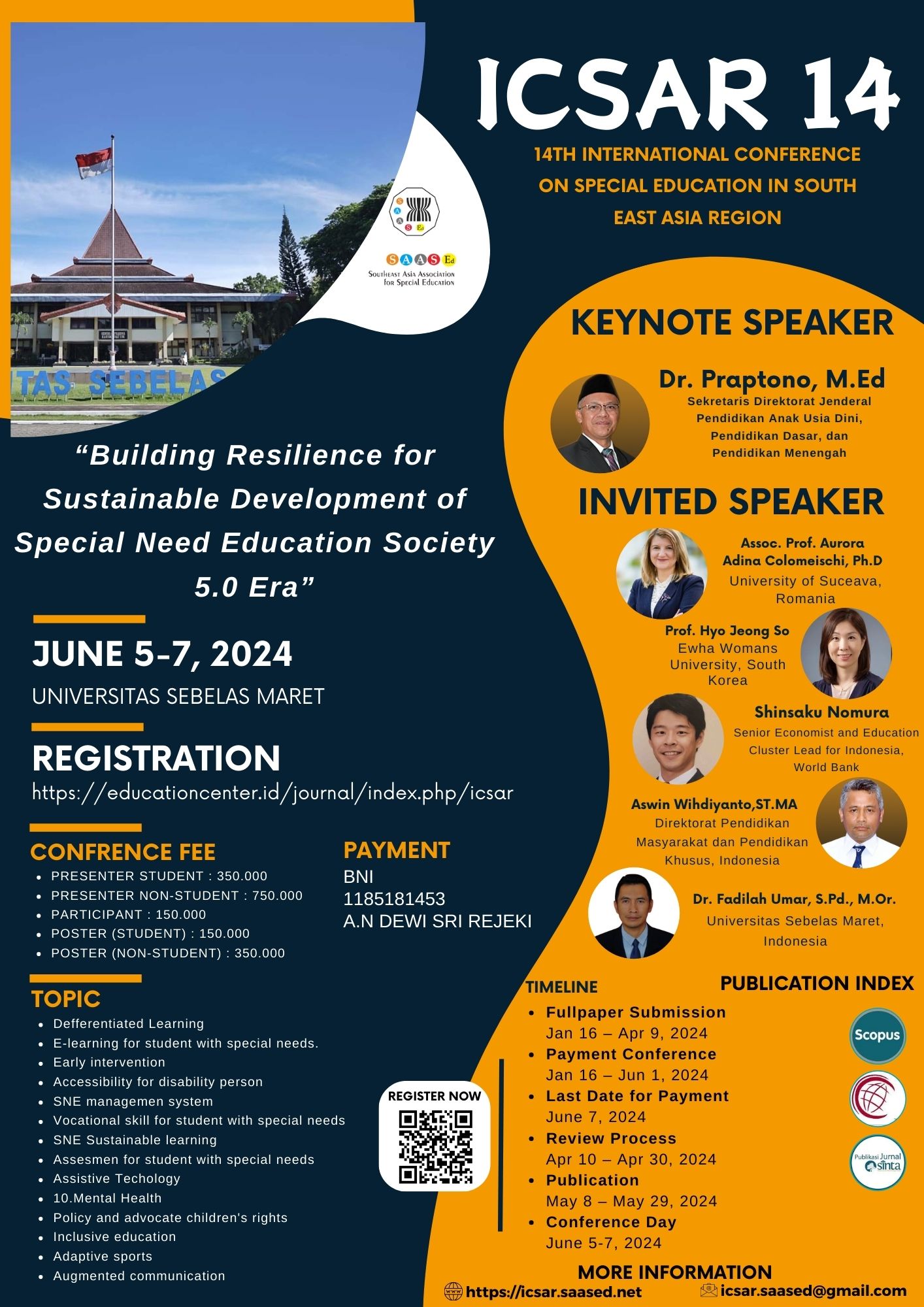Pedagogical Competency Development Program for Special Supervising Teachers for Slow Learner Children at SMPN 6 Jakarta
DOI:
https://doi.org/10.57142/picsar.v3i1.617Keywords:
Pedagogical Competenciy Development, Inclusive EducationAbstract
The main philosophical foundation in implementing inclusive education in Indonesia is the Pancasila philosophy which has the motto "Unity in Diversity" which is a symbol and symbol of recognition that Indonesia is a multi-cultural, multi-ethnic and multi-language country, customs, religions and beliefs as a wealth that must be guarded, maintained and developed within the framework of the Republic of Indonesia. For this reason, abnormalities (disabilities) and giftedness are just a form of diversity, just like differences in ethnicity, race, language, culture or religion. Education should not need to differentiate between children in learning in the classroom. This is the case at SMPN 6 Jakarta as one of known to be around 12 students, the majority of whom are slow learners. Meanwhile, the condition of the teachers at SMPN 6 is also considered to have low pedagogical competence in dealing with children with slow learner needs, all of whom are general teachers. However, these limitations create problems during the learning process at school, especially in individual learning. The research results show that: (a) the pedagogical competence of special supervising teachers at SMPN 6 Jakarta is still lacking in understanding pedagogical competence; (b) the obstacle experienced by teachers is the unavailability of training programs that support teachers' understanding and mastery of students with special needs; (c) formulation of a training program to improve the pedagogical competence of special supervising teachers at SMPN 6 Jakarta for children with special needs in the form of a training program; and (d) the results of the implementation test of the pedagogical competency training program for special supervising teachers at SMPN 6 Jakarta showed that it had a significant positive impact.
References
Budiyanto, Pengantar Pendidikan Inklusif: Berbasis Budaya Lokal, (Jakarta: Prenada Media, 2017).
Desi Nova Natalia Gultom, Standard Kompetensi Mengajar Guru, (t.p., 2021).
E. Mulyasa, Standar Kompetensi dan Sertifikasi Guru, (Bandung: Remaja Rosdakarya, 2014).
Farah Arriani, dkk., Panduan Pelaksanaan Pendidikan Inklusif, (Jakarta: Badan Penelitian dan Pengembangan dan Perbukuan, Departemen Pendidikan dan Kebudayaan, Riset dan Teknologi, 2021).
Hamsi Mansur, Pendidikan Inklusif: Mewujudkan Pendidikan Untuk Semua,
(Yogyakarta: Parama Pulishing, 2019).
Joko Yuwono, dkk., Buku Saku Penyelenggaraan Pendidikan Inklusif di Sekolah Dasar, (Jakarta: Direktorat Sekolah Dasar, Departemen Pendidikan dan Kebudayaan, Riset dan Teknologi, 2021).
Minsih, Pendidikan Inklusif Sekolah Dasar: Merangkul Perbedaan dalam Kebersamaan, (Yogyakarta: Mulawarman University Press, 2020).
Nursyamsudin, dkk., Penyelenggaraan Pendidikan Inklusif di Sekolah Menengah Atas (SMA), (Jakarta: Direktorat SMA, Direktorat Jenderal Pendidikan Anak Usia Dini, Pendidikan Dasar, dan Pendidikan Menengah, Departemen Pendidikan dan Kebudayaan, Riset dan Teknologi, 2021).
Rasmitadila, Penyelenggaraan Pendidikan Inklusif, (Jakarta: Raja Grafindo Persada, 2020).
Rina Febriana, Kompetensi Guru, Cetakan Pertama, (Jakarta: Bumi Aksara, 2019).
Septy Nurfadhillah, dkk., Mengenal Pendidikan Inklusi di Sekolah Dasar,
(Sukabumi: CV. Jejak Publisher, 2021).
Yeni Yulianti, dkk., Naskah Kebijakan Pendidikan Inklusif bagi Penyandang Disabilitas, (Jakarta: Penerbit Badan Riset dan Inovasi Nasional, 2022).
Kiki Mundia Sari & Heru Setiawan, (2020) “Kompetensi Pedagogik Guru dalam Melaksanakan Penilaian Pembelajaran Anak Usia Dini”, Jurnal Obsesi: Pendidikan Anak Usia Dini, Vol. 4 (2), UIN Sulthan Thaha Saifuddin Jambi.
Leonita Dwi Agustin & Weny Savitry S. Pandia, (2014) “Pemahaman Pedagogik Guru dalam Mengajar Anak Berkebutuhan Khusus di Sekolah Inklusi”, Provitae Jurnal Psikologi Pendidikan, Vol. 6 (1), Universitas Katolik Atma Jaya.
Olivia Mardhatillah & Jun Surjanti, (2023) “Peningkatan Kompetensi Pedagogik dan Profesionalitas Guru di Indonesia Melalui Pendidikan Profesi Guru (PPG)”, Jurnal Pendidikan Ekonomi Undiksha, Vol. 15 (1), Program Studi Pendidikan Ekonomi Universitas Negeri Surabaya.
Rasmitadila, Widyasari & Teguh Prasetyo, (2021) “Persepsi Guru Pembimbing Khusus terhadap Manfaat Model Strategi Pembelajaran Berbasis Sistem Pembelajaran Alamiah Otak (SiPAO) bagi Siswa Berkebutuhan Khusus (ABK) di Kelas Inklusif”, Jurnal Pendidikan Guru Sekolah Dasar, Vol. 8 (2), Fakultas Keguruan dan Ilmu Pendidikan Universitas Djuanda Bogor.
Ratna Sari Wulandari & Wiwin Hendriani, (2021) “Kompetensi Pedagogik Guru Sekolah Inklusi di Indonesia: Suatu Pendekatan Systematic Review”, Jurnal Kependidikan: Hasil Penelitian dan Kajian Kepustakaan di Bidang Pendidikan, Pengajaran dan Pembelajaran, Vol. 7 (1), Universitas Airlangga Surabaya.
Ruwaida Zafira, (2015) “Kompetensi Pedagogik Guru Pada Anak Berkebutuhan Khusus (ABK) di SDN Inklusi Klampis Ngasem 1 Surabaya”, Jurnal Pendidikan Guru SD, Vol. 3 (2), Fakultas Ilmu Pendidikan Universitas Negeri Surabaya.
Creswell, J. W. (2014). Educational Research: Planning, Conducting, and Evaluating Quantitative and Qualitative Research Educational Research, https://doi.org/10.1017/CBO9781107415324.004. .
Ekins, A., Savolainen, H., & Engelbrecht, P. (2016). An Analysis Of English Teachers Self-Efficacy In Relation To SEN And Disability And Its Implications In A Changing SEN Policy Context,
https://doi.org/10.1080/08856257.2016.1141510.
Forlin, C. Sharma, & Loreman, T. (2014), Predictors Of Improved Teaching Efficacy Following Basic Training For Inclusion In Hong Kong, https://doi.org/10.1080/13603116.2013.819941.
Kunsting, J. Neuber & Lipowsky, F (2016). Teacher Self-Efficacy As A Long- Term Predictor Of Instructional Quality In The Classroom, https://doi.org/10.1007/s10212-015-0272-7.
Monteiro, E., Kuok & Teixeira, V. (2019), Perceived Efficacy Of Teachers In Macao And Their Alacrity To Engage With Inclusive Education, https://doi.org/10.1080/13603116.2018.1514762.
Montgomery & Mirenda (2014), Teacher’s Self-Efficacy, Sentiments, Attitudes, And Concerns About Inclusion of Students, pada laman https://open.library.ubc.ca/cIRcle/collections/ubctheses/24/items/1.07191 3.
Mulholland & O’Connor, (2016), Collaborative Classroom Practice For Inclusion: Perspectives Of Classroom Teachers And Learning, https://doi.org/10.1080/13603116.2016.1145266
Downloads
Published
How to Cite
Issue
Section
License
Copyright (c) 2024 Proceeding of International Conference on Special Education in South East Asia Region

This work is licensed under a Creative Commons Attribution 4.0 International License.





